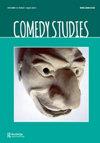Red-nosed fantasies of the future: a framework for social justice-informed performance creation in the Mump and Smoot Lineage of the Pochinko tradition of clowning
Q1 Arts and Humanities
引用次数: 0
Abstract
Abstract This article contextualises a specific lineage of the Pochinko tradition of clowning – which the author refers to as the Mump and Smoot Lineage – before offering an analysis of Judith Butler’s argument for the necessity of fantasy in social change. Putting these two analyses into dialogue, the article offers provocations and theories as to how clowning might provide a fruitful avenue for social justice-motivated fantasy as it is described by Judith Butler. The paper asks and offers responses to two central questions. Firstly, how might understanding clowning’s relationship to social justice pursuits be of use to those creating clown performances? Secondly, how can the practice and craft of the Mump and Smoot Lineage of the Pochinko Tradition of Cowning (MSLPTC) work in service of social justice aims? The author argues that the methodologies of this lineage do not require great alterations to work in meaningful service of social justice aims; the use of a message to the world, the focus on imaginative embodiment, and many of the lineage’s rules are easily deployed in service of social justice-oriented creation. In making these assertions, the author articulates a hope for further research into clowning and its intersections with social justice practice and also that clown practitioners might use their existing practices to further social justice goals.红鼻子对未来的幻想:波钦科小丑传统的Mump和Smoot家族中基于社会正义的表演创作框架
摘要本文结合了波钦科小丑传统的一个特定谱系——作者称之为木乃伊和烟雾谱系——然后分析了朱迪斯·巴特勒关于幻想在社会变革中的必要性的论点。这篇文章将这两个分析放在对话中,就朱迪斯·巴特勒所描述的小丑如何为基于社会正义的幻想提供富有成效的途径提出了挑衅和理论。本文提出并回答了两个核心问题。首先,理解小丑与社会正义追求的关系对那些创造小丑表演的人有什么用处?其次,波钦科牛仔传统(MSLPTC)的Mump和Smoot血统的实践和工艺如何为社会正义目标服务?作者认为,这一谱系的方法不需要对有意义地服务于社会正义目标的工作进行重大改变;向世界传递信息,关注富有想象力的化身,以及许多谱系规则,都很容易被用于服务于以社会正义为导向的创造。在做出这些断言时,作者表达了对小丑及其与社会正义实践的交叉点进行进一步研究的希望,以及小丑从业者可能会利用他们现有的实践来推进社会正义目标。
本文章由计算机程序翻译,如有差异,请以英文原文为准。
求助全文
约1分钟内获得全文
求助全文
来源期刊

Comedy Studies
Arts and Humanities-Literature and Literary Theory
CiteScore
0.60
自引率
0.00%
发文量
26
 求助内容:
求助内容: 应助结果提醒方式:
应助结果提醒方式:


